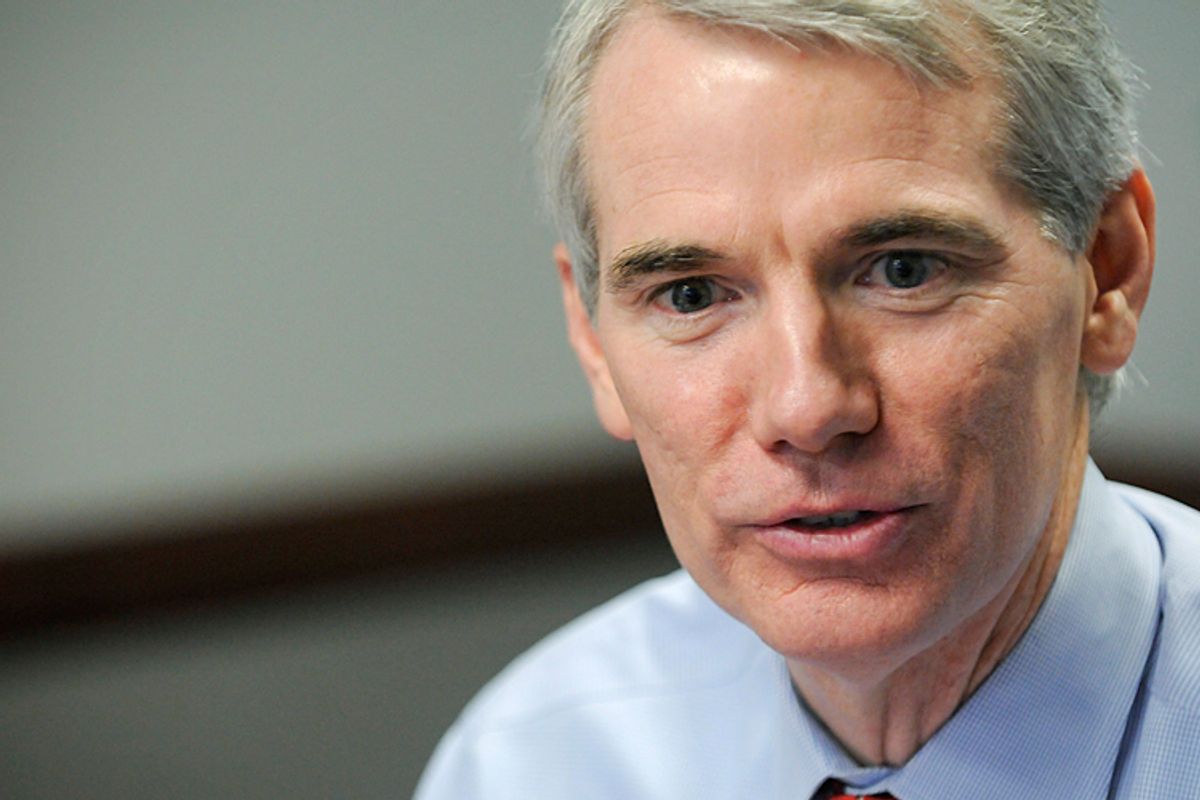Ohio Sen. Rob Portman announced Monday that he won't seek the Republican Party's presidential nomination in 2016, opting instead to seek a second term in the U.S. Senate. While a number of considerations -- the demands of fundraising, the strain of long days on the stump, the other candidates likely to enter the race -- figure into these decisions, it's exceedingly difficult to escape the sense that one factor above all others determined Portman's choice.
That factor, of course, is the senator's support for same-sex marriage, which he declared in 2013, shortly after his son Will came out as gay. Portman's announcement drew the wrath of social conservatives, and the anti-gay National Organization for Marriage vowed to actively oppose a Portman presidential run. Though Portman says the enmity of the GOP's anti-gay base "really wasn't a factor" in his decision not to make the plunge, there's really no other way to make sense of the matter.
Consider Portman's résumé: A former trade representative and budget director for George W. Bush who served in the House of Representatives from 1993 to 2005 and won a landslide Senate victory in a crucial battleground state in 2010, Portman would have easily ranked as one of the most experienced of the GOP's presidential contenders. A reliable vote for pro-corporate policies, Portman would likely have had little trouble raising the funds necessary to mount a serious campaign.
Moreover, save his support for marriage equality, his right-wing credentials are sterling: He's thoroughly opposed to reproductive rights, Obamacare, gun control and labor rights. While Portman's support for his gay son sets him apart from other conservatives who refused to reconsider their discriminatory views despite having LGBT children, we aren't exactly talking about Arlen Specter here.
But even as surveys show a cultural sea change on same-sex marriage, supporting gay couples' freedom to marry remains a third rail of national GOP politics. To be sure, a majority of young Republicans back marriage equality, but those most likely to vote in GOP primaries continue to be obstinately opposed. A mere 27 percent of Republicans over 50 support marriage equality, and two-thirds of those over 65 think that more same-sex couples raising children is a "bad thing" for American society, according to a recent Pew Research Center poll. A Washington Post-ABC News poll in March showed that white evangelicals -- a key GOP constituency -- oppose same-sex marriage by a decisive 66 to 28 percent. Meanwhile, a Gallup poll this spring found that only 30 percent of Republicans and 31 percent of conservatives overall favored same-sex marriage -- a stark difference from the general public, 55 percent of whom supported marriage equality.
While a sizable minority of Republicans back same-sex marriage, the party's national leaders are nearly unanimously opposed, and Portman's decision not to run virtually ensures a GOP field bereft of a single marriage equality supporter. To the extent that the leading Republican contenders differ on the issue, it's over tone and emphasis. Chris Christie and Scott Walker -- two candidates beloved by the Republican donor class, which generally holds relaxed views on social issues -- both concede that the marriage equality fight is over in their states, though they're careful to reassure conservatives that they still wish it weren't so. Jeb Bush, another favorite of party power brokers, also opposes full equality for same-sex couples, but he doesn't want to talk about it, proclaiming that marriage equality is nothing more than a "distraction" from the economy.
Then there are the strident opponents of gay marriage, including Rick "Man on Dog" Santorum, Ted Cruz, Mike Huckabee and Ben Carson, each of whom is sure to insert the issue into the 2016 debate. These men can't even abide Republicans who oppose same-sex marriage but would prefer to talk about other issues; imagine how fiercely they'd denounce a fellow candidate who actually supported marriage equality.
So there's your internal GOP debate on marriage equality. The party will nominate either a candidate who opposes same-sex marriage, or one who opposes it harder.



Shares